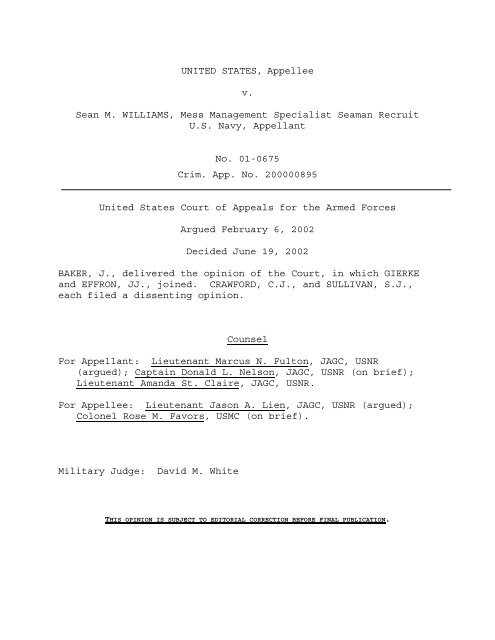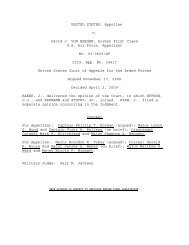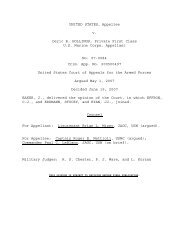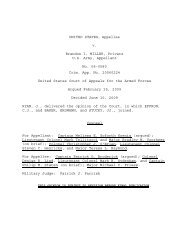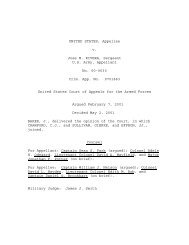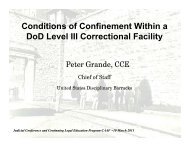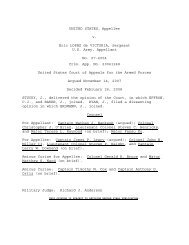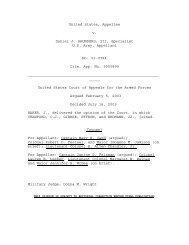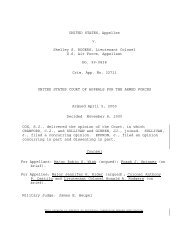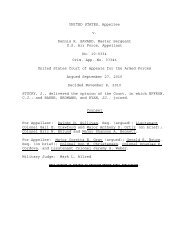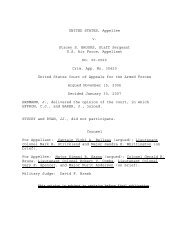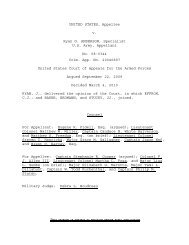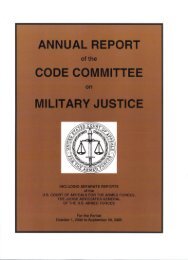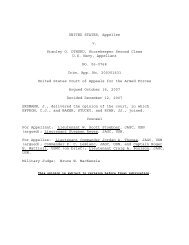U.S. v. Williams - U.S. Court of Appeals for the Armed Forces
U.S. v. Williams - U.S. Court of Appeals for the Armed Forces
U.S. v. Williams - U.S. Court of Appeals for the Armed Forces
Create successful ePaper yourself
Turn your PDF publications into a flip-book with our unique Google optimized e-Paper software.
UNITED STATES, Appelleev.Sean M. WILLIAMS, Mess Management Specialist Seaman RecruitU.S. Navy, AppellantNo. 01-0675Crim. App. No. 200000895United States <strong>Court</strong> <strong>of</strong> <strong>Appeals</strong> <strong>for</strong> <strong>the</strong> <strong>Armed</strong> <strong>Forces</strong>Argued February 6, 2002Decided June 19, 2002BAKER, J., delivered <strong>the</strong> opinion <strong>of</strong> <strong>the</strong> <strong>Court</strong>, in which GIERKEand EFFRON, JJ., joined. CRAWFORD, C.J., and SULLIVAN, S.J.,each filed a dissenting opinion.CounselFor Appellant: Lieutenant Marcus N. Fulton, JAGC, USNR(argued); Captain Donald L. Nelson, JAGC, USNR (on brief);Lieutenant Amanda St. Claire, JAGC, USNR.For Appellee: Lieutenant Jason A. Lien, JAGC, USNR (argued);Colonel Rose M. Favors, USMC (on brief).Military Judge: David M. WhiteTHIS OPINION IS SUBJECT TO EDITORIAL CORRECTION BEFORE FINAL PUBLICATION.
United States v. <strong>Williams</strong>, No. 01-0675/NAJudge BAKER delivered <strong>the</strong> opinion <strong>of</strong> <strong>the</strong> court.On November 16, 1999, appellant pled guilty without <strong>the</strong>benefit <strong>of</strong> a pretrial agreement to unauthorized absence,larceny, and <strong>for</strong>gery, in violation <strong>of</strong> Articles 86, 121, and 123,Uni<strong>for</strong>m Code <strong>of</strong> Military Justice, 10 USC §§ 886, 921, and 923,respectively. A military judge sitting as a special courtmartialfound appellant guilty in accordance with <strong>the</strong>se pleasand adjudged a bad-conduct discharge, confinement <strong>for</strong> 100 days,and a fine <strong>of</strong> $1,500. The convening authority approved <strong>the</strong>sentence as adjudged, and <strong>the</strong> <strong>Court</strong> <strong>of</strong> Criminal <strong>Appeals</strong> affirmedin an unpublished opinion. No. 200000895 (N-M. Ct. Crim. App.May 7, 2001). The granted issue requires our review <strong>of</strong> <strong>the</strong>post-trial handling <strong>of</strong> a military servicemember’s case. 1Here,we find error and remand.BACKGROUNDAfter announcing <strong>the</strong> sentence during appellant’s courtmartial,<strong>the</strong> military judge made <strong>the</strong> following comments on <strong>the</strong>record:I would ask <strong>the</strong> trial counsel to passto <strong>the</strong> convening authority <strong>the</strong> nature andcontent <strong>of</strong> <strong>the</strong> accused’s stated desire tohave ano<strong>the</strong>r chance and that he’s learnedhis lessons and that <strong>the</strong> convening authorityand <strong>the</strong> chain <strong>of</strong> command that knows Seaman1Granted Issue:WHETHER THE COURT OF CRIMINAL APPEALS ERRED IN FAILING TOREMAND THIS CASE TO THE CONVENING AUTHORITY FOR A NEW COMMANDJUDGE ADVOCATE’S RECOMMENDATION AND CONVENING AUTHORITY’SACTION CONSISTENT WITH THE ASSIGNMENT OF ERROR RAISED BELOW.2
United States v. <strong>Williams</strong>, No. 01-0675/NARecruit <strong>Williams</strong> take into considerationwhe<strong>the</strong>r <strong>the</strong>y want to defer or suspend anyportion <strong>of</strong> this sentence in order to allowhim to have a suspended bad-conductdischarge and demonstrate that his stateddesire to continue his enlistment issomething that he can pull <strong>of</strong>f.I say that in light <strong>of</strong> <strong>the</strong> nicetestimonials from two pastors and from hismo<strong>the</strong>r concerning his intended desire to dowell in <strong>the</strong> Navy, as well as his youth, andrealizing that hopefully, if he has learnedfrom this experience and <strong>the</strong> brig canper<strong>for</strong>m its rehabilitative function, thatSeaman Recruit <strong>Williams</strong> may have anopportunity to fulfill that enlistment.On January 19, 2000, trial defense counsel submittedmatters to <strong>the</strong> convening authority on behalf <strong>of</strong> appellantpursuant to RCM 1105, Manual <strong>for</strong> <strong>Court</strong>s-Martial, United States(2000 ed.). 2 The submission expressly requested, inter alia,that <strong>the</strong> convening authority suspend <strong>the</strong> bad-conduct discharge.However, it did not reference <strong>the</strong> military judge’s comments madeon <strong>the</strong> record. The command judge advocate’s recommendation(CJAR), dated April 19, 2000, includes <strong>the</strong> first paragraph <strong>of</strong><strong>the</strong> military judge’s comments quoted above, but not <strong>the</strong> secondparagraph. Trial defense counsel acknowledged receipt <strong>of</strong> <strong>the</strong>recommendation on May 24, 2000; however, <strong>the</strong> convening authorityissued his action <strong>the</strong> previous day, May 23, 2000.RCM 1106(f) requires <strong>the</strong> following:(1) Service <strong>of</strong> recommendation on defensecounsel and accused. Be<strong>for</strong>e <strong>for</strong>warding <strong>the</strong>2All Manual provisions cited are identical to those in effect at <strong>the</strong> time <strong>of</strong>trial.3
United States v. <strong>Williams</strong>, No. 01-0675/NArecommendation and <strong>the</strong> record <strong>of</strong> trial to<strong>the</strong> convening authority <strong>for</strong> action underRCM 1107, <strong>the</strong> staff judge advocate or legal<strong>of</strong>ficer shall cause a copy <strong>of</strong> <strong>the</strong>recommendation to be served on counsel <strong>for</strong><strong>the</strong> accused.The court below found failure to serve defense counselprior to <strong>the</strong> convening authority’s action in this case to beharmless error since <strong>the</strong> commander’s action stated that he hadconsidered <strong>the</strong> CJAR, <strong>the</strong> accused’s RCM 1105 submissions, and <strong>the</strong>record <strong>of</strong> trial. On January 15, 2002, this <strong>Court</strong> grantedappellant’s motion to attach trial defense counsel’s sworndeclaration that <strong>the</strong> recommendation was not served on him untilafter <strong>the</strong> convening authority had taken action in <strong>the</strong> case. Healso stated:. . . I would have commented on <strong>the</strong> command judgeadvocate’s selective excerpting <strong>of</strong> <strong>the</strong> militaryjudge’s clemency recommendation. I would haveprovided <strong>the</strong> omitted portion <strong>of</strong> <strong>the</strong> clemencyrecommendation to <strong>the</strong> convening authority with arequest that he thoroughly consider <strong>the</strong> recommendation<strong>of</strong> <strong>the</strong> military judge in its entirety and that heaccordingly suspend MSSR <strong>Williams</strong>’ bad-conductdischarge.DISCUSSIONThe Government’s contention is that appellant has failed tomake a colorable showing <strong>of</strong> prejudice under United States v.Chatman, 46 MJ 321 (1997). We have consistently held that“service <strong>of</strong> <strong>the</strong> SJA’s recommendation on <strong>the</strong> accused’s counsel isa critical part <strong>of</strong> <strong>the</strong> accused’s post-trial representation.”United States v. Mark, 47 MJ 99, 101 (1997)(citing United States4
United States v. <strong>Williams</strong>, No. 01-0675/NAv. Moseley 35 MJ 481, 484-85 (CMA 1992)). Fur<strong>the</strong>r, we agreewith Judge Gierke’s view espoused in Moseley that[t]he service requirement in Article 60(d), Uni<strong>for</strong>mCode <strong>of</strong> Military Justice, 10 USC § 860(d) (1986), andRCM 1106(f), Manual <strong>for</strong> <strong>Court</strong>s-Martial, United States,1984, was intended to incorporate <strong>the</strong> proceduresmandated by this <strong>Court</strong> in United States v. Goode, 1 MJ3 (CMA 1975). S.Rep. No. 53, 98th Cong., 1st Sess.20-21 (1983); Drafters' Analysis, Manual, supra atA21-73. The purpose <strong>of</strong> <strong>the</strong> service requirementimposed in Goode was ‘to eliminate delays encounteredin claims <strong>of</strong> error in post-trial reviews and <strong>the</strong>exhaustion <strong>of</strong> appellate resources when such errorcould easily and expeditiously be resolved prior to<strong>the</strong> convening and supervisory authorities' actions.’United States v. Hill, 3 MJ 295, 296 (CMA 1977).Moseley, supra at 486 (concurring in part and dissenting inpart).In Chatman, we addressed <strong>the</strong> question <strong>of</strong> <strong>the</strong> standard to beapplied when a staff judge advocate fails to serve on <strong>the</strong>defense a copy <strong>of</strong> an addendum that contains “new matter” towhich an accused has <strong>the</strong> right to respond. See RCM 1106(f)(7).We required an appellant to “demonstrate prejudice by statingwhat, if anything, would have been submitted to deny, counter,or explain <strong>the</strong> new matter.” 46 MJ at 323 (internal quotationsomitted). We fur<strong>the</strong>r indicated that “<strong>the</strong> threshold should below, and if an appellant makes some colorable showing <strong>of</strong>possible prejudice, we will give that appellant <strong>the</strong> benefit <strong>of</strong><strong>the</strong> doubt and we will not speculate on what <strong>the</strong> conveningauthority might have done if defense counsel had been given anopportunity to comment.” Id. at 323-24 (internal quotations5
United States v. <strong>Williams</strong>, No. 01-0675/NAomitted)(emphasis added). In United States v. Howard, 47 MJ104, 107 (1997), we extended this standard to cases involvingfailure to serve <strong>the</strong> original recommendation on defense counsel.We accept without more trial defense counsel’s statement inhis declaration that he would have commented on <strong>the</strong> commandjudge advocate’s failure to include <strong>the</strong> second part <strong>of</strong> <strong>the</strong>military judge’s comments. 3We disagree with <strong>the</strong> Government that<strong>the</strong> omitted part <strong>of</strong> <strong>the</strong> military judge’s comments was simply arepeat <strong>of</strong> <strong>the</strong> first part. In <strong>the</strong> second part <strong>of</strong> his comments,<strong>the</strong> military judge stated <strong>the</strong> basis <strong>for</strong> his personal view thatappellant was worthy <strong>of</strong> <strong>the</strong> type <strong>of</strong> clemency he wasrecommending. These comments indicated that <strong>the</strong> "nicetestimonials from two pastors and from his mo<strong>the</strong>r concerning hisintended desire to do well in <strong>the</strong> Navy," considered by <strong>the</strong>military judge during sentencing, had moved him to make thisparticular clemency recommendation. More importantly, <strong>the</strong>second part <strong>of</strong> <strong>the</strong> military judge’s comments included hisfavorable assessment <strong>of</strong> appellant’s rehabilitative potential.Given <strong>the</strong> numerous <strong>of</strong>fenses with which appellant was originally3Nei<strong>the</strong>r <strong>the</strong> record nor defense counsel’s declaration mentions when counselbecame aware <strong>of</strong> <strong>the</strong> fact that <strong>the</strong> convening authority had already issued hisaction by <strong>the</strong> time <strong>the</strong> CJAR was received. We remind counsel that RCM1107(f)(2) allows <strong>the</strong> convening authority to recall and modify any actionprior to <strong>for</strong>warding <strong>the</strong> record <strong>for</strong> review.6
United States v. <strong>Williams</strong>, No. 01-0675/NAcharged, 4<strong>the</strong> convening authority might logically have given <strong>the</strong>on-<strong>the</strong>-record remarks little weight in <strong>the</strong> absence <strong>of</strong> <strong>the</strong>military judge’s stated reasons <strong>for</strong> making <strong>the</strong>m.“The essence <strong>of</strong> post-trial practice is basic fair play—notice and an opportunity to respond.” United States v. Leal,44 MJ 235, 237 (1996). It certainly would have been within <strong>the</strong>convening authority’s discretion to decline <strong>the</strong> military judge’srecommendation, even had counsel been provided <strong>the</strong> opportunityto comment. However, appellant had <strong>the</strong> right to have hiscounsel served <strong>the</strong> recommendation in accordance with RCM1106(f). In this case, he also had <strong>the</strong> attendant right torespond to <strong>the</strong> command judge advocate’s failure to include <strong>the</strong>military judge’s favorable recommendation in its entirety.Wehold that appellant was denied <strong>the</strong>se rights when his counsel wasnot served <strong>the</strong> recommendation prior to <strong>the</strong> convening authority’saction, and that he has made a “colorable showing” <strong>of</strong> prejudice. 54In addition to <strong>the</strong> <strong>of</strong>fenses to which appellant entered pleas <strong>of</strong> guilty, hewas also charged with five specifications <strong>of</strong> failure to go, one specification<strong>of</strong> disrespect to a chief warrant <strong>of</strong>ficer, one specification <strong>of</strong> disrespect topetty <strong>of</strong>ficers, one specification <strong>of</strong> disobeying a commissioned <strong>of</strong>ficer, onespecification <strong>of</strong> disobeying a petty <strong>of</strong>ficer, two specifications <strong>of</strong> makingfalse <strong>of</strong>ficials statements, and one specification <strong>of</strong> communicating a threat.These <strong>of</strong>fenses were withdrawn without prejudice by <strong>the</strong> government just be<strong>for</strong>e<strong>the</strong> military judge entered findings <strong>of</strong> guilty in accordance with appellant’spleas. They were ultimately dismissed by <strong>the</strong> Government at trial.5We have become increasingly concerned with what we view as a lack <strong>of</strong>attention to <strong>the</strong> post-trial process. For instance, <strong>the</strong> convening authority’saction in this case purports to implement appellant’s automatic reduction toE-1 under Article 58a, UCMJ, 10 USC § 858a. This is curious since appellantwas already at grade E-1 at <strong>the</strong> time <strong>of</strong> trial.7
United States v. <strong>Williams</strong>, No. 01-0675/NADECISIONThe decision <strong>of</strong> <strong>the</strong> United States Navy-Marine Corps <strong>Court</strong><strong>of</strong> Criminal <strong>Appeals</strong> and <strong>the</strong> action <strong>of</strong> <strong>the</strong> convening authorityare set aside. The record <strong>of</strong> trial is returned to <strong>the</strong> JudgeAdvocate General <strong>of</strong> <strong>the</strong> Navy <strong>for</strong> remand to a convening authority<strong>for</strong> a new post-trial recommendation and action. Thereafter,Articles 66 and 67, UCMJ, 10 USC §§ 866 and 867, respectively,will apply.8
United States v. <strong>Williams</strong>, No. 01-0675/NACRAWFORD, Chief Judge (dissenting):While <strong>the</strong>re must be accountability in eliminating errors asto <strong>the</strong> command judge advocate’s (CJA) recommendation, appellantis required to show a colorable claim <strong>of</strong> prejudice. UnitedStates v. Chatman, 46 MJ 321, 323-24 (1997); see also UnitedStates v. Wheelus, 49 MJ 283, 286-87 (1998). That has not beendone. Nor is <strong>the</strong>re any chance that appellant will be retainedin <strong>the</strong> service as a result <strong>of</strong> a new CJA recommendation andaction by <strong>the</strong> convening authority. One only needs to askwhe<strong>the</strong>r <strong>the</strong> Navy wants to have appellant or a new recruit <strong>of</strong>f<strong>the</strong> street in <strong>the</strong> service. The answer, based on his <strong>of</strong>fenses,is obvious.FACTSAppellant was an eighteen-year-old sailor with less than ayear <strong>of</strong> active service at <strong>the</strong> time <strong>of</strong> <strong>the</strong> <strong>of</strong>fenses and wasassigned to <strong>the</strong> USS ABRAHAM LINCOLN at <strong>the</strong> Puget Sound NavalShipyard, Bremerton, Washington. Over a four-month period,appellant was absent without leave from his unit on fourseparate occasions. These absences occurred on May 6-11, June1-4 and 7-25, and June 28-September 3, 1999. Appellant <strong>of</strong>feredno excuses <strong>for</strong> his absences o<strong>the</strong>r that he just did not want togo to work. He stayed in <strong>the</strong> local area during his first threeabsences and <strong>for</strong> a good portion <strong>of</strong> his last absence. His last
United States v. <strong>Williams</strong>, No. 01-0675/NAunauthorized absence terminated when he turned himself in at <strong>the</strong>Great Lakes base in Chicago after traveling through Texas.On August 1, 1999, appellant stole $1,500.00 from <strong>the</strong>Washington Mutual Bank in Everett, Washington. He did so bydepositing a <strong>for</strong>ged check into his checking account using <strong>the</strong>ATM. Over <strong>the</strong> next few days, he withdrew <strong>the</strong> funds from hischecking account. He obtained <strong>the</strong> blank check from SenitriaLarue, whose account at Washington Mutual Bank had been closed.Appellant <strong>for</strong>ged Senitria Larue’s signature on <strong>the</strong> check andmade it payable to himself in <strong>the</strong> amount <strong>of</strong> $1,500.00.Appellant was convicted based on his pleas <strong>of</strong> guilty.After announcing <strong>the</strong> sentence, <strong>the</strong> military judge made <strong>the</strong>following comment:I would ask <strong>the</strong> trial counsel to pass to <strong>the</strong>convening authority <strong>the</strong> nature and content <strong>of</strong> <strong>the</strong>accused’s stated desire to have ano<strong>the</strong>r chance andthat he’s learned his lessons and that <strong>the</strong> conveningauthority and <strong>the</strong> chain <strong>of</strong> command that knows SeamanRecruit <strong>Williams</strong> take into consideration whe<strong>the</strong>r <strong>the</strong>ywant to defer or suspend any portion <strong>of</strong> this sentencein order to allow him to have a suspended bad-conductdischarge and demonstrate that his stated desire tocontinue his enlistment is something that he can pull<strong>of</strong>f.I say that in light <strong>of</strong> <strong>the</strong> nice testimonials fromtwo pastors and from his mo<strong>the</strong>r concerning hisintended desire to do well in <strong>the</strong> Navy, as well as hisyouth, and realizing that hopefully, if he has learnedfrom this experience and <strong>the</strong> brig can per<strong>for</strong>m itsrehabilitative function, that Seaman Recruit <strong>Williams</strong>may have an opportunity to fulfill that enlistment.2
United States v. <strong>Williams</strong>, No. 01-0675/NAOn January 21, 2000, his defense counselsubmitted a request <strong>for</strong> clemency. The CJA completedhis recommendation, dated April 19, 2000, and submitted it to<strong>the</strong> defense counsel, who did not acknowledgereceipt <strong>of</strong> <strong>the</strong> CJA recommendation until May 24, 2000. Nei<strong>the</strong>rdefense counsel nor appellant objected to <strong>the</strong> conveningauthority taking action be<strong>for</strong>e acknowledgement <strong>of</strong> <strong>the</strong> receipt <strong>of</strong>service. The convening authority took action and approvedappellant’s sentence on May 23, 2000. The action reflects that“<strong>the</strong> record <strong>of</strong> trial, <strong>the</strong> results <strong>of</strong> trial, <strong>the</strong> defense’sclemency request dated 21 January 2000, and <strong>the</strong> Command JudgeAdvocate’s recommendation have been considered.”The court below found that <strong>the</strong> convening authority erred bytaking action be<strong>for</strong>e <strong>the</strong> CJA’s recommendation was served on <strong>the</strong>detailed defense counsel. In a footnote to its opinion, <strong>the</strong>court below stated:The convening authority’s action states that <strong>the</strong>[C]JAR was submitted to <strong>the</strong> appellant’s defensecounsel on 1 May 2000. None<strong>the</strong>less, we choose torely on <strong>the</strong> date <strong>of</strong> acknowledgment by <strong>the</strong> defensecounsel.Unpub. op. at 2 n.1.DISCUSSIONRCM 1106(f)(5) states: “Counsel <strong>for</strong> <strong>the</strong> accused shall begiven 10 days from service <strong>of</strong> <strong>the</strong> record <strong>of</strong> trial under RCM1104(b) or receipt <strong>of</strong> <strong>the</strong> recommendation, whichever is later, in3
United States v. <strong>Williams</strong>, No. 01-0675/NAwhich to submit comments on <strong>the</strong> recommendation.” The courtbelow acknowledged that <strong>the</strong> convening authority erred by takingaction be<strong>for</strong>e <strong>the</strong> ten days had expired. I agree.None<strong>the</strong>less, appellant is not entitled to relief unless heis able to demonstrate prejudice. The court below found noprejudice because appellant’s earlier clemency submission <strong>of</strong>January 21, 2000, was be<strong>for</strong>e <strong>the</strong> convening authority, andappellant has failed to show what additional clemency matters hewould have submitted.Thus, I cannot conclude that appellant was prejudiced by<strong>the</strong> failure <strong>of</strong> <strong>the</strong> CJA’s recommendation to include <strong>the</strong> secondparagraph <strong>of</strong> <strong>the</strong> military judge’s clemency recommendation.4
United States v. <strong>Williams</strong>, No .01-0675/NASULLIVAN, Senior Judge (dissenting):I agree with <strong>the</strong> majority that <strong>the</strong> convening authority erredby taking action in this case be<strong>for</strong>e defense counsel was servedwith <strong>the</strong> command staff judge advocate’s recommendation. Seegenerally United States v. Johnston, 51 MJ 227, 229 (1999).Never<strong>the</strong>less, I am not convinced that appellant has made acolorable showing <strong>of</strong> possible prejudice. United States v.Chatman, 46 MJ 321, 323-24 (1997); see United States v. Schrode,50 MJ 459 (1999).In this regard, I note that all defense clemency materialswere submitted to and considered by <strong>the</strong> convening authority priorto his taking action in this case. Moreover, <strong>the</strong> command staffjudge advocate in his post-trial review called <strong>the</strong> conveningauthority’s attention to <strong>the</strong> military’s judge favorable commentson <strong>the</strong> suspension <strong>of</strong> <strong>the</strong> bad-conduct discharge. Finally,although <strong>the</strong> command staff judge advocate did not repeat verbatim<strong>the</strong> military judge’s comments, <strong>the</strong>y were in <strong>the</strong> record <strong>of</strong> trialand, <strong>the</strong>re<strong>for</strong>e, be<strong>for</strong>e <strong>the</strong> convening authority.I fur<strong>the</strong>r note that defense counsel himself in his earlierclemency submissions in this case did not reference <strong>the</strong> militaryjudge’s post-sentence comments. Such inaction may suggest errorby <strong>the</strong> defense counsel at trial; however, appellant did not raisethat issue on this appeal. Moreover, <strong>the</strong> omission frommentioning this matter in <strong>the</strong> clemency materials may reflect <strong>the</strong>defense’s belief that <strong>the</strong> trial judge’s comments were not that
United States v. <strong>Williams</strong>, No. 01-0675/NAhelpful. In all <strong>the</strong>se circumstances, I would affirm on <strong>the</strong> basis<strong>of</strong> harmless error. See United States v. Kho, 54 MJ 63, 65 (2000)(no plain error in failure to note military judge’srecommendation on sentence where clearly not prejudicial undercircumstances <strong>of</strong> case).2


